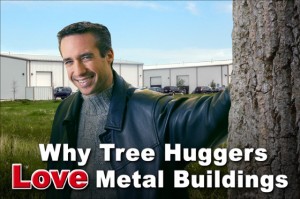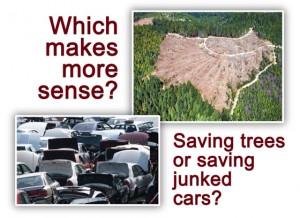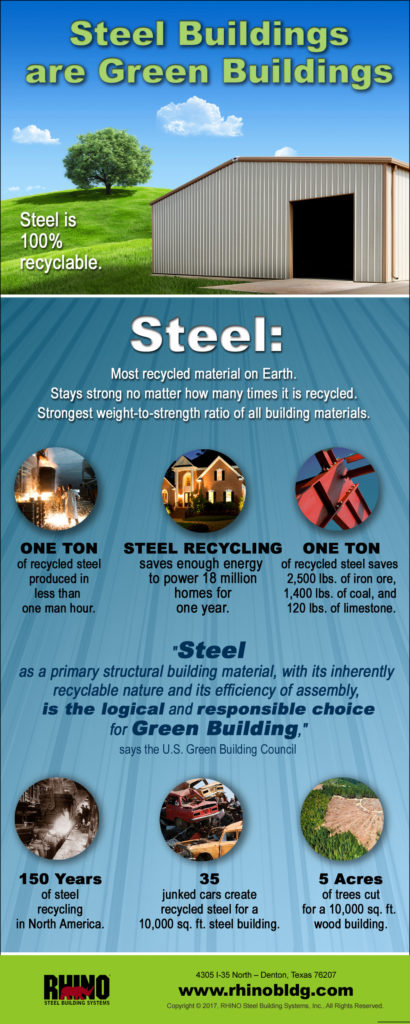Building with Steel Saves Trees— and Our Planet!
Why would self-proclaimed “tree huggers” love metal buildings? Because every structure built with steel framing instead of wood framing saves trees.
Breathe Easier with More Trees
 Deforestation diminishes the single greatest asset in combating air pollution— trees. So what is so great about trees? Here are just a few of the reasons we need to protect forests:
Deforestation diminishes the single greatest asset in combating air pollution— trees. So what is so great about trees? Here are just a few of the reasons we need to protect forests:
- Trees actually scrub our atmosphere. Trees inhale carbon dioxide from polluted air and exhale life-sustaining oxygen into the atmosphere.
- A single tree absorbs forty pounds of carbon dioxide in a year. U.S. forests remove over 1.5 trillion pounds of carbon dioxide annually.
- In addition to cleaning the carbon dioxide from the air, trees also reduce many other harmful air pollutants, including sulfur dioxide, nitrogen oxides, ozone, and peroxyacetylnitrate.
- The more trees we have on the planet, the cleaner our air quality becomes. Yet 58,000 square miles of forest are destroyed worldwide each year. That is thirty-six football field-sized forests decimated every minute!
- A tree’s leaves absorb pollution particulates. Tree leaves trap ash, dust, pollen, and smoke particles on their surfaces, reducing the amount of these harmful substances in our air.
- Forfeiting forests leaves the land bare to soil erosion.
- Deforestation changes local biodiversity, contribution to harmful climate changes.
- Forests aren’t the only place where trees are sacrificed to progress. Urban sprawl destroys trees as well.
- Trees in cities help decontaminate the air, diminish the stifling heat known as the urban heat island effect, and help block noise pollution with their foliage.
- Through their leaves, trees also create an evaporative effect, cooling surrounding air.
Today’s Steel Industry
True environmentalists adore nature and deplore industry. Certainly, eco-conscious conservationists have had issues with the steel industry in the past. But the benefits of using steel for eco-friendly construction far outweigh the minimal drawbacks of creating the steel.
 Although steel production a century ago was indeed a major polluter, the steel industry has really cleaned up its act. Here’s how:
Although steel production a century ago was indeed a major polluter, the steel industry has really cleaned up its act. Here’s how:
- Fantastic innovations made by the North American steel industry slashed air and water emissions by 90% in only ten years.
- Recycling one ton of steel cuts the CO2 emissions 80% over producing new steel from scratch.
- Steel production today requires 35% less energy than it did forty years ago.
- Modern steel is 30% stronger than the steel manufactured ten years ago. Consequently, even less steel is required to construct even stronger structures.
Steel: The Recycling King
Nature lovers demand recycled materials for “green” buildings. No other building material comes close to the recycling performance of steel.
 The following facts provide the reasons for steel’s recycling dominance:
The following facts provide the reasons for steel’s recycling dominance:
- All steel is 100% recyclable.
- Steel is recycled far more than any other substance in the world— eighty million tons of annually just in North America.
- More steel is recycled each year than all other materials combined.
- Unlike other recycled materials, steel never losing any of its strength when recycled. Steel recycled one hundred times is just as strong as when originally produced.
- Recycling is not a new concept to steel makers. North American steel manufacturers have been recycling steel for over 150 years. Why? Recycling steel is actually cheaper to produce than virgin steel.
- Compared to producing virgin steel, every ton of recycled steel created saves 2,500 pounds of iron ore, 1,400 pounds of coal, and 120 pounds of limestone, and 10,900,000 Btu’s of energy.
- Producing recycled steel over virgin steel reduces water use by 40%, air pollution by 86%, and mining waste by 97%.
- Steel’s magnetic properties make separating it from mixed waste simple and inexpensive.
- Advances in steel-making techniques yield a ton of steel in less than one man-hour.
Saving Trees by Building with Steel
The U.S. Green Building Council states: “Steel as a primary structural building material, with its inherently recyclable nature and its efficiency of assembly, is the logical and responsible choice for Green Building.”
LEED (the Leadership in Energy & Environmental Design) program certifies green building projects by points. Steel is the only building material in the program’s list of green building products to earn an automatic minimum default, based on its high recycled content.
About five acres of forest produce the lumber for a 10,000 square-foot building. In one year, the trees in that same five acres of forest would absorb the carbon dioxide equal to 65,000 miles of automobile pollution.
Harvesting five acres of forest leaves the one to one-and-a-half tons of air pollutants that those trees would have processed in the air we breathe.
The same 10,000 square-foot structure could be framed with steel recycled from thirty to thirty-five junked cars.
Not only does choosing to build with steel instead of wood preserve forests to clean our air, it is also the logical long-term choice. Pre-engineered steel buildings outlast wood-framed structures by decades.
When a wood building reaches the end of its usefulness, the owner pays to haul the discarded lumber to a landfill. Construction dumps 136 million tons of debris into straining U.S. landfills each year.
Conversely, when the lifespan of a steel building is over, the steel framing is sold as scrap to be recycled once again.
Join the Greenies Who Love Metal Buildings
Join the green movement. Help eliminate pollution. Save the trees by building with RHINO Steel Building Systems.
RHINO’s commercial-grade steel framing boasts a high level of recycled steel.
RHINO’s clients love metal buildings for aircraft hangars, barns and stables, churches, commercial enterprises, industrial buildings, offices, recreational buildings, storage buildings, stores, warehouses, personal-use, and other low-rise structures.
You can learn more about building green with steel. Talk to a RHINO metal building specialist today about eco-friendly construction. Contact RHINO today at 940.383.9566.
